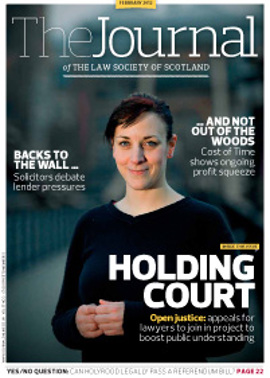The limits of hearsay

In Al-Khawaja and Tahery v United Kingdom (Applications nos 26766/05 and 22228/06), 15 December 2011, the Grand Chamber of the European Court of Human Rights (ECtHR) was asked to determine whether the use of hearsay evidence in two separate criminal cases in England led to a breach of the applicants’ rights to a fair trial under article 6(1) read in conjunction with article 6(3)(d) of the Convention.
Article 6(1) ECtHR provides the basic right to a fair and public hearing, with article 6(3)(d) specifically guaranteeing that everyone charged with a criminal offence will have an opportunity “to examine or have examined witnesses against him and to obtain the attendance and examination of witnesses on his behalf under the same conditions as witnesses against him”.
Time to depart
A decision of a chamber of the ECtHR in 2009 had found violations of article 6 in relation to both applicants, as where the conviction was based solely or to a decisive degree on the hearsay evidence, there were no counterbalancing features of the process which could sufficiently compensate for the disadvantage caused to the defence to result in a fair trial (the “sole or decisive” rule). This decision was appealed to the Grand Chamber, whose judgment was delayed pending the decision of the UK Supreme Court in R v Horncastle [2009] UKSC 14.
The Supreme Court was highly critical of the chamber’s decision. Lord Phillips’ leading judgment noted that s 2 of the Human Rights Act 1998 requires domestic courts to take account of ECtHR decisions, but if they were not felt to have sufficiently accommodated or appreciated an aspect of English law they did not have to be followed. He stated that the chamber’s decision in Al-Khawaja and Tahery was such a decision.
Lord Phillips further criticised the way exceptions to the absolute rule in article 6(3)(d) had been adopted by the ECtHR, stating that this had resulted in “a jurisprudence that lacks clarity”, and that the “sole or decisive” rule on which the chamber’s judgment hinged, had been introduced into that jurisprudence “without discussion of the principle underlying it or full consideration of whether there was justification for imposing the rule as an overriding principle applicable equally to the continental and common law jurisdictions”.
Grand Chamber restatement
In responding to the Supreme Court, the Grand Chamber recalled the general principles of article 6, and that the court’s primary concern was to “evaluate the overall fairness of the criminal proceedings”. It then set out to examine whether the “sole or decisive” rule was, as the chamber had determined, an absolute rule in guaranteeing a fair trial.
It was recognised by the Grand Chamber that exceptions to the strict common law rule against the admission of hearsay had been made in England & Wales, and that there were both statutory and common law safeguards in place to guarantee fairness, notwithstanding the application of these exceptions. The court, therefore, considered that the central question was whether the application of those safeguards was sufficient to secure the applicants’ article 6 rights, while ensuring a consistent application of article 6 irrespective of the legal system from which a case emanated.
The Grand Chamber concluded, having analysed the opinion of the Supreme Court and comparative materials from other UK and common law jurisdictions, that a breach of the “sole or decisive” rule does not automatically result in a breach of article 6. However, where “a conviction is based solely or decisively on the evidence of an absent witness the court must subject the proceeding to the most searching scrutiny”. The court accepted that the statutory and common law safeguards in relation to the admission of hearsay evidence are “in principle, strong safeguards designed to ensure fairness”. The court then considered whether in the case of each applicant those safeguards were applied in a manner which was compliant with article 6, finding a violation in Mr Tahery’s case, but no violation in Mr Al-Khawaja’s case.
Fruitful dialogue
At a time when the interaction between the ECtHR and national courts has been subject to much comment, Sir Nicolas Brazta, the UK judge who took up office as President of the ECtHR in November 2011, noted in his concurring opinion to the Grand Chamber’s judgment that Al-Khawaja and Tahery is a good example of “judicial dialogue between national courts and the [ECtHR] on the application of the Convention”. The Grand Chamber, although not able to entirely agree with the Supreme Court, took on board its opinion and responded with a thorough and reasoned review of the application of article 6(3)(d).
In this issue
- Credit hire: a tug of war?
- As others see them
- Taking care of the dead
- Act like a trustee, think like a fund manager
- Beating the stress bug
- Reading for pleasure
- John McNeil, CBE, WS: an appreciation
- Opinion column: Open Justice
- Council profile
- Book reviews
- President's column
- On the move
- Between a rock and a hard place
- Tough times are still ahead
- Care: a new direction
- Officer class
- Open questions
- Fuller benches
- The limits of hearsay
- If you don't ask, you don't get?
- Fees: not so simple?
- Easing the debt block
- Registering our concerns
- Room at the top
- The best of times, the worst of times
- Law reform roundup
- Work and Cancer: employers’ toolkit
- From the Brussels office
- Post with caution
- Ask Ash
- The learning curve
- Business checklist
- Hear us, we say






